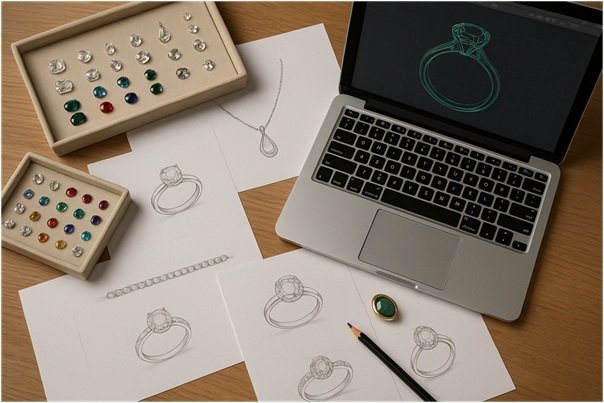Building a jewelry line without the overhead of a workshop may seem impossible—but it’s precisely what agile brands are doing today. By embracing jewelry private labeling, companies can launch signature collections fast, focus on brand storytelling, and maintain margins without investing in physical manufacturing infrastructure. According to NIQ’s Mid‑Year Consumer Outlook report, 50% of global shoppers said they’re buying more private label products than ever before in 2024. This surge in private label adoption reflects a growing consumer trust in value-driven, brand-centric collections—an opportunity jewelry entrepreneurs can leverage through smart partnerships.
Accelerated Time-to-Market
Traditional vertical integration—owning design, production, and distribution facilities—adds time, cost, and logistical complexity. By partnering with a private label manufacturer, brands can bypass the production ramp-up. Jewelry designers can take concepts from sketch to showroom-ready in weeks, not months. This speed allows brand owners to stay relevant and react nimbly to emerging trends, quickly adapting collections based on customer feedback, seasonal demands, or viral styles. With reduced overhead and faster turnaround, companies can allocate more resources to marketing, brand building, and innovation, ensuring they remain competitive in a dynamic marketplace where timing often determines success.
Risk Mitigation and Cost Control
Manufacturing jewelry in-house often requires substantial capital: casting equipment, skilled labor, safety protocols, and inventory storage. Outsourcing production removes those fixed costs. Brands pay for each collection run on demand, allowing them to test the market without excess investment. This model offers scalability—orders can be ramped up for successful styles or dialed back without financial waste.
Advantages of Captioned Partnerships
| Advantage | How It Helps Brand Owners |
| Cost Savings | No capital tied up in equipment, facilities, or staff |
| Flexibility | Scale production up or down with market demand |
| Focused Expertise | Tap into manufacturers’ refined craftsmanship and infrastructure |
| Streamlined Launches | Faster iteration cycles—new designs can go live quickly |
| Global Access | Reach new markets using manufacturing partners’ distribution capabilities |
Craftsmanship Without Taking the Helm
A reputable manufacturing partner brings decades of jewelry-making expertise. They’re equipped with the latest technologies—CAD, laser engraving, precision molding—and artisan skills that ensure each piece meets rigorous quality standards. This lets brand owners concentrate on design direction, market positioning, and buyer relationships.
Enhancing Design Freedom
Outsourced production enables experimentation. Brands can launch limited-edition lines, capsule drops, or seasonal collections without committing to large runs. This agility is a powerful tool to build exclusivity and drive demand while testing new aesthetics.
Sustainable and Ethical Advantage
Modern manufacturers often prioritize sustainability—using recycled metals, offering lab-grown gemstones, and maintaining ethical supply chains. By aligning with such partners, brands can market their collections as beautiful and responsible—without building those processes from scratch.
Storytelling That Resonates
Customers today crave transparency. Brands that collaborate with ethical, skilled workshops can craft compelling origin stories. Whether it’s “designed in our studio, handcrafted by master makers,” or “metal reclaimed, gems responsibly sourced,” these narratives deepen brand authenticity and connection.
The Real Win: Business Focus Shift
Perhaps most importantly, outsourcing allows brand founders to stay in their zone of mastery—marketing, customer relations, and brand curation. Instead of managing fulfillment, mold flaws, or production hiccups, they can refine their messaging, build their following, and plan strategic launches that grow momentum.
Conclusion: The Future of Jewelry Brands Is Collaborative
Launching a jewelry brand without a workshop isn’t a compromise—it’s a strategic advantage. The rising preference for private label collections (with 50% of consumers leaning into them) shows that brand, story, and quality matter more than the making process behind closed doors. By partnering with trusted manufacturers, jewelry entrepreneurs can focus on what they do best—crafting a vision, connecting with customers, and building a brand that shines with its own light.




